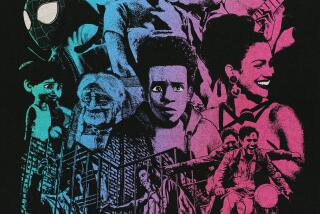The Lifeblood of Carnaval Pulses Through ‘Orfeu’
- Share via
Carlos Diegues’ “Orfeu” is such an original and intoxicating creation in its ownright that it should not be considered a remake of “Black Orpheus.”
That 1959 French classic also loosely transposed the Greek myth of Orpheus to Rio de Janeiro’s enduring shantytown, Carioca Hill, as the five days of Carnaval unfold. Whereas the ‘50s film was drenchingly romantic in the tradition of fatalistic French cinema, “Orfeu” is a veritable folk opera of such intense, stylized theatricality and dynamic cultural fusions that only a filmmaker of Diegues’ stature and experience could still come through with a film that would be no less vivid.
World-renowned composer Caetano Veloso produced the film’s seductive, insistent and haunting music, and cinematographer Affonso Beato captured sequences of the actual Carnaval in the richest of colors. “Orfeu” is totally captivating, as seductive as a samba.
Orfeu (Toni Garrido) is the King of Carioca Hill, a young singer-composer whose songs have mesmerized audiences far beyond his neighborhood. He could afford to leave but prefers to stay, true to his roots. He is good-looking, kind but, not surprisingly, also a devastating ladies’ man. He’s involved with a gorgeous, ambitious model, Mira (Isabel Fillardis) but is instantly swept off his feet by Euridice (Patricia Franca).
Euridice has just arrived from the Amazon in the wake of her gold miner father’s death. She’s staying temporarily with her glamorous but embittered aunt, Carmen (Maria Ceica), who was Orfeu’s very first love--and who has never gotten over it. The arrival of the beautiful Euridice, alas, does not go unnoticed by Lucinho (Murilo Benicio), the handsome but morose leader of the worst gang of drug traffickers that have made life in Carioca Hill dangerous, constantly triggering brutal raids by corrupt police.
“Orfeu” seethes with dark portents while throwing itself into the spirit of Carnaval, with Orfeu leading the local Carioca samba school’s elaborate entry into the parade, which passes through Rio’s vast open-air Sambadrome in a blinding array of glitteringly costumed samba dancers and equally bespangled floats. Orfeu’s vibrant mother, Conceica~o, is played by Zeze Motta, a longtime Diegues regular.
“Orfeu” is heady and exaggerated, so rigorously stylized with star-crossed lovers so appealing and music so irresistible that its fairy-tale world--charged with all-too-real contemporary social ills--comes vividly alive. Drawing from--and updating, in the process--the play by Vinicius de Moraes, the great Brazilian poet, Diegues (best known for “Xica” and “Bye Bye Brazil”) reaffirms his dominant position in Latin American cinema.
* Unrated. Times guidelines: considerable violence, drug content, adult themes and situations.
‘Orfeu’
Toni Garrido: Orfeu
Patricia Franca: Euridice
Murilo Benicio: Lucinho
Zeze Motta: Conceica~o
A New Yorker Films release. Director Carlos Diegues. Producers Renata Almeida Magalha~es and Paula Lavigne. Screenplay by Diegues, with the collaboration of Hermano Vianna, Hamilton Vaz Periera, Paulo Lins and Jos~o Emanuel Carneiro’ based on the play by Vinicius de Moraes. Cinematographer Affonso Beato. Editor Sergio Melker. Music Caetano Veloso. Costumes Emilia Duncan. Production designer Clovis Bueno. Carnaval art director Joa~ozinho Trinta. In Portuguese, with English subtitles. Running time: 1 hour, 50 minutes.
Exclusively at the Fine Arts, 8556 Wilshire Blvd., Beverly Hills, (310) 652-1330; the Playhouse 7, 673 E. Colorado Blvd., Pasadena, (626) 844-6500; and South Coast Village 3, 1561 W. Sunflower Ave., (714) 540-0594 or (714) 777-FILM (No. 323).
More to Read
Only good movies
Get the Indie Focus newsletter, Mark Olsen's weekly guide to the world of cinema.
You may occasionally receive promotional content from the Los Angeles Times.










